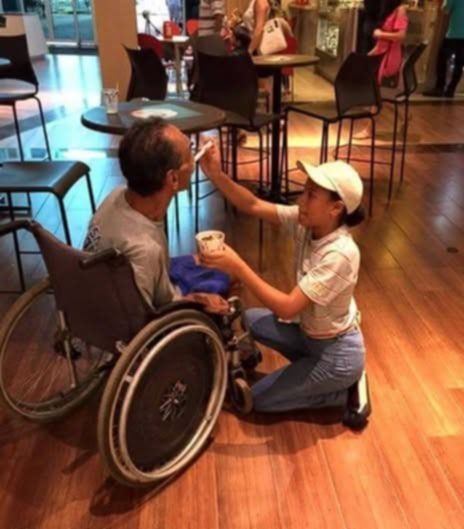
It was one of those scorching afternoons when the blast of air conditioning inside McDonald’s felt like salvation. I was working the front counter, juggling the usual chaos of the lunch rush—orders piling up, kids yelling, fries spilling, and the ice cream machine acting like it was seconds from breaking down.
By about 2:30, things finally slowed. That’s when I noticed an older man sitting alone at a corner table. He was hunched in his wheelchair, staring at a half-melted ice cream cone as if it had defeated him. People walked past, pretending not to see.
I couldn’t explain why, but I grabbed some napkins and headed over.
“Mind if I give you a hand?” I asked, expecting him to brush me off. But he just gave a faint nod.
I sat down, cleaned up the sticky mess, and steadied the next cone so he could eat without it dripping everywhere. It only took ten minutes, barely cutting into my break.
But when I stood to leave, I noticed the atmosphere shift. A woman near the window whispered to her friend while glancing at me. A regular raised an eyebrow. Even my manager, Luis, shot me a look like I’d done something wrong.
I brushed it off at first—until Luis pulled me aside before I clocked out. “Try to keep things like that outside of work hours,” he said carefully.
I was ready to ask why when a drive-thru worker told me someone outside wanted to see me.
It was the woman from earlier. She met my eyes and said, “You don’t know who that man is, do you?”
I felt defensive. “No. He just needed help.”
She sighed. “His name’s Alfred. He’s been around for years. People say he’s trouble. I’d stay away if I were you.”
Her tone carried both warning and gossip. I thanked her politely but couldn’t shake my curiosity.
That night, as I clocked out, I mentioned to Luis that I didn’t see how I’d done anything wrong. He shrugged. “Management doesn’t like us getting too involved. Liability issues. Just… be careful.”
The next day I came in for a later shift, and Alfred was there again—this time with a coffee. His hands shook as he tried to hold it. Against my better judgment, I walked over.
“Alfred?” I said, testing the name.
He looked up, surprised, then softened. “You remembered. Not many do.”
I sat down. “People seem nervous around you. Why?”
He leaned closer. “Because of my past. I used to manage a housing project. When the company sold it off, families got evicted, and everyone blamed me. I had no real power—I was just the messenger. But rumors stuck.”
He paused, eyes clouded with regret. “I tried to help some families, but no one remembers that. My health failed soon after. Family drifted away. Now I survive on a pension and the kindness of strangers.”
I listened in silence. Suddenly the whispers about him made sense, though it still felt unjust.
Later, on my day off, I found him sitting by the park. We talked for hours. He told me the full story: how he became the scapegoat, how his reputation collapsed, and how he’d been living with that shadow ever since.
“I don’t want pity,” Alfred said. “Just for people to know I tried.”
I believed him.
From then on, I’d bring him coffee when I could. Coworkers teased me, warning not to get “too close.” But slowly, other people began to notice Alfred differently. Mrs. Novak, one of our blunt regulars, even apologized for misjudging him after overhearing part of our talk.
In time, Alfred decided to volunteer at a local community center, helping families with housing paperwork. “It’s my way of making things right,” he told me. I offered him rides when I was free.
Bit by bit, the neighborhood view of Alfred shifted. People saw him helping, contributing, trying. Even Luis softened, eventually admitting he’d been wrong to judge.
Before long, Alfred was part of the McDonald’s rhythm. Customers greeted him by name. He’d share stories with strangers and joke about how ice cream cones cost a quarter when he was young.
One afternoon, as I cleaned tables, he wheeled over. “Heading to the center,” he said. “Just wanted to say thanks—for everything.”
I realized then how one small act—just steadying an ice cream cone—had changed both his life and mine.
People will always whisper, judge, and spread rumors. But often the truth is buried beneath fear and assumptions. Sometimes all it takes to uncover it is kindness and a willingness to listen.
Alfred taught me that compassion doesn’t have to be grand. It can be as simple as noticing someone struggling and choosing to help anyway.
So if you see someone who needs a hand, don’t hesitate. The world has enough whispers. What it needs are more people who act with kindness, even when no one else does.

